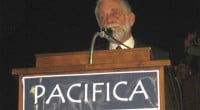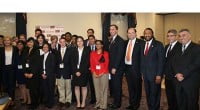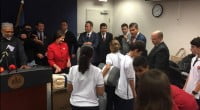Doesn’t Obama know Gülen is in the US?

Date posted: March 11, 2014
MURAT YETKİN
In a statement on March 8, the White House made a half-correction of what Turkish Prime Minister Tayyip Erdoğan has been saying about a telephone conversation with U.S. President Barack Obama on Feb. 19. That was the first phone conversation between the two leaders in over six months.
The statement had nothing to do with the strategic parts of the conversation, which were actually mentioned by officials both in Ankara and Washington DC. The two leaders did indeed discuss critical issues like Syria, Iraq, Iran, Israel, Cyprus and Ukraine.
In the White House readout after the conversations, there was no reference of the massive corruption claims about the Erdoğan government and the series of new legislation bringing more political control over the judiciary and the Internet. There was only a note about the importance of the rule of law in Turkey.
From the day after the conversation onwards, Erdoğan has underlined another point, which is critical to current political affairs in Turkey. According to Erdoğan, he and Obama discussed the presence of Fethullah Gülen in the U.S. and the irritation he has been giving to the government.
Gülen, a U.S. Green Card holder, is a moderate Islamist scholar with a global network of sympathizers who has been living in a farmhouse in Pennsylvania since the mid-1990s. He used to be one of Erdoğan’s closest allies, especially while he was clearing Erdoğan’s way to the 50 percent popular support from the old secular establishment and military with the help of his sympathizers in the judiciary and security system.
When Erdoğan started to feel threatened by the Gülen presence within the state apparatus from 2012 on, the picture started to change.
The graft probe, which started on Dec. 17, 2013, brought the fight within religious/conservative politics in the country to surface. Erdoğan had to force four of his ministers to resign because of corruption allegations and had to face a bombardment of phone tapping recordings about his alleged interventions in government tenders, bribe connections and media affairs. He has repeatedly denounced Gülen as the source of what he called a “coup attempt.”
According to Erdoğan, when he discussed the situation with Obama, the U.S. president said he had “got the message.” On a live TV show, he added that he believed Obama would “do what’s necessary,” implying that Gülen might be extradited to Turkey.
The White House statement came the next day, saying that Erdoğan’s words referring to Obama were “not accurate.”
That is why I call it a “half-correction”; the White House still doesn’t say what the “accurate” wording was. To this day, it has not been possible to get an on-the-record or even background statement from either Turkish or American sources about the “accurate” wording of Obama’s answer to Erdoğan.
It would not make sense to assume that Obama did not know about Gülen’s presence in his country after all the debate and before making that phone call to Erdoğan.
Gülen has hundreds of schools in the U.S. as well. But they are not Turkish schools, as Gülenists promote them in Turkey, like the thousands of them in more than 100 countries across the world.
Gülen’s global schools are English-language schools run by Muslim Turks in places where it would be very difficult for American or British teachers to work, both politically and financially.
It may be rather easy for Erdoğan to phone to Pakistan Prime Minister Nawaz Sharif to ask him to close the more than 20 Gülen-run schools in the Punjab region. But it may not be so easy to ask for the closure of Gülen schools in the U.S., or even to ask for Gülen’s extradition without even a court order against him.
It is possible that Obama briefly confirmed that he is aware of the situation without making a comment, in order to avoid being involved in Turkish politics ahead of the March 30 local elections.
Perhaps after the elections we will be able to learn exactly what Obama said to Erdoğan, and whether he will do anything regarding the latter’s Gülen problem.
Source: Hurriyet Daily , March 11, 2014
Tags: Fethullah Gulen | North America | USA |
























